China Brands, Marketing & Consumers
BMW Ice Cream Gate: Three Reasons Why a MINI Story Became a Major Incident
There is more behind the BMW MINI ice cream incident than ice cream alone.
Published
1 year agoon
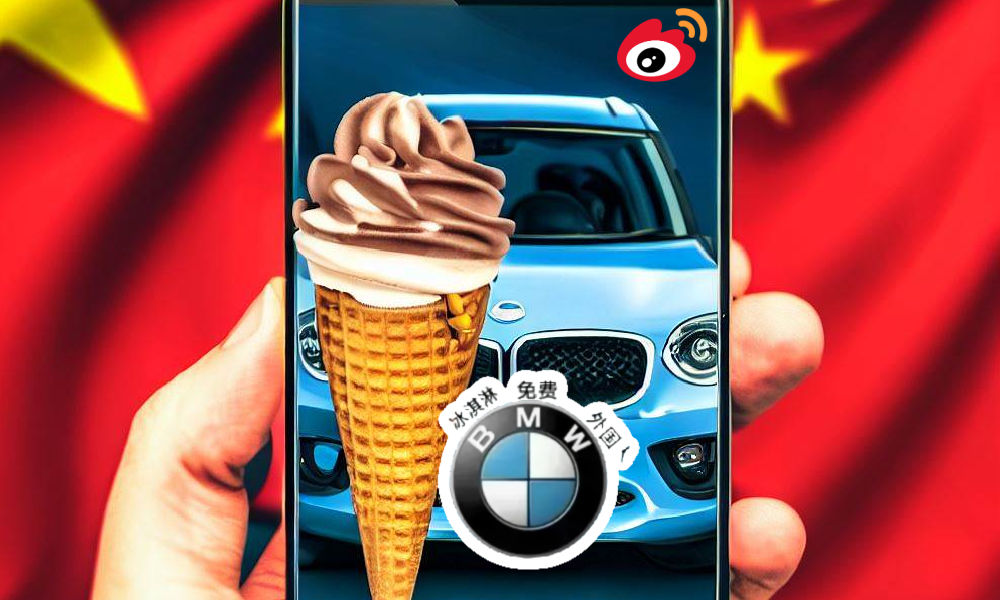
The Shanghai Auto Show’s BMW MINI booth and its employees found themselves at the center of a social media storm after a video of their free ice cream promotional campaign made it seem like foreigners got free ice cream while Chinese visitors were told no. The incident has had a major impact, both online and offline. What caused a seemingly minor event to escalate into a significant controversy?
It is the noteworthy incident that made international headlines over the past week: a freebie marketing campaign by German automotive company BMW at the Shanghai Auto Show went horribly wrong.
The incident happened on April 20, 2023, at the Shanghai show’s MINI booth, where two Chinese female workers were giving out free ice cream from a local brand.
A video was posted on Chinese video platforms Bilibili and Douyin that showed staff at the booth refusing ice cream to a local visitor by stating that it had all been given away. However, when a foreign attendee approached, the staff suddenly had ice cream readily available for them.
The person who was filming, a Chinese man named Sun, then stepped up to the booth and ask for ice cream himself. The girls then suggested an app was needed for that, and that they had limited supplies. The video further showed that the only people actually enjoying the Luneurs brand ice cream were all foreigners.
The video footage soon went viral and sparked public outrage over discrimination against Chinese visitors of the show.
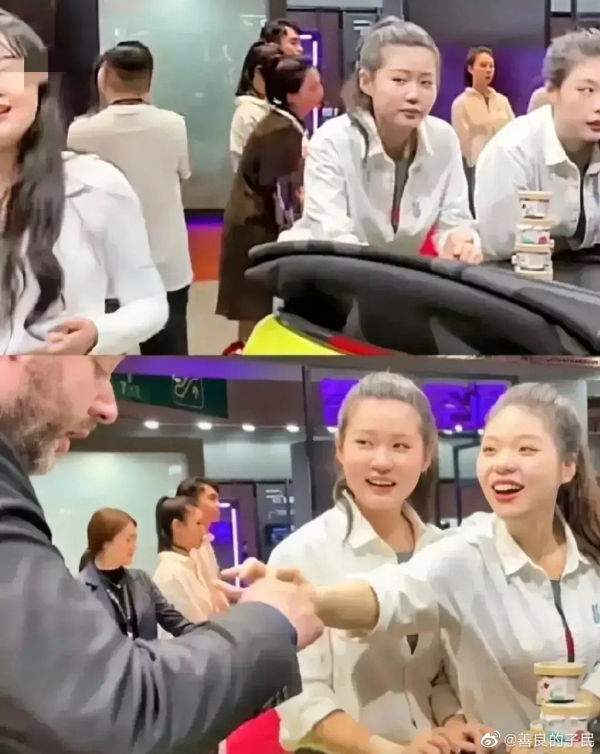
Screenshots from the video showed employees ignoring Chinese visitors and giving foreigners icecream (via Weibo).
BMW MINI tried to avert a marketing disaster by issuing an official apology via its social media channels in China on the same day, stating that they regretted that their sweet promotional campaign caused unhappiness “due to the lack of internal management and staff negligence.”

Many people, however, thought the apology was insufficient. “ChatGPT could write [a better apology] than this,” a typical comment said, and some even gave examples of ChatGPT writing a better apology.
“If I can speak English can I have some ice cream?”, another popular comment said. Others said they would never consider buying BMW again.
On April 21, BMW MINI released another statement on its Weibo account, in which they indicated that they had given away 600 ice creams in two days for people coming to the booth with vouchers distributed via the MINI app. At the booth, they had also set aside a few ice creams for their own “very hard-working colleagues” at the show. The statement said that the foreigners in the video were all BMW colleagues, wearing a badge.
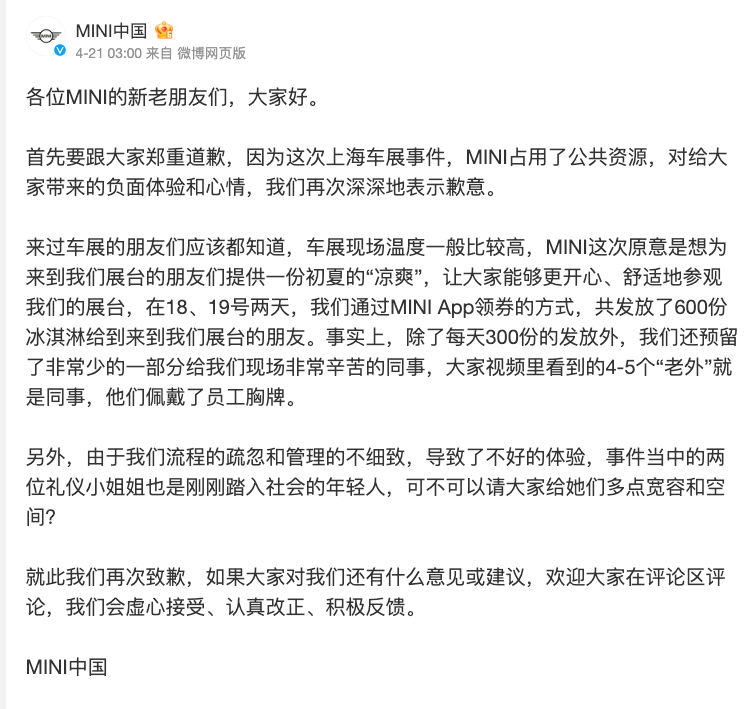
They again apologized for the controversy and admitted they had mismanaged the situation, adding that they hope that people can have some tolerance and space for the two female workers who are young and were just newly employed.
The two female employees were reportedly dismissed and the ice cream promotional campaign was stopped (#宝马mini两名发冰淇淋女生已离职#). “You should replace your PR team,” some people suggested.
The controversy further intensified when news came out that, also on Thursday, one female live blogging at the BMW MINI booth was sent away and removed by security.
How could ice creams at an auto show trigger such heated nationwide discussions? There are multiple factors, including historical, societal, marketing, and online media dynamics, that contributed to the incident becoming such a significant issue.
1. Painful History: “No Dogs and Chinese Allowed”
One of the reasons why the BMW MINI story triggered such sharp criticism, accusations of racism, and emotional reactions, is because the incident stirs up collective memories of a sensitive period in history when Chinese faced humiliation and discrimination by the hands of foreign powers.
In discussions on the BMW MINI ice cream incident, the phrase “Chinese and Dogs Not Admitted” (“华人与狗不得入内”) came up again and again in online comments and memes.
The phrase is widely remembered in the context of a sign in front of Shanghai’s Huangpu Park that was closed to Chinese people in the late 19th and early 20th centuries during the International Settlement. The fact that the ice cream incident took place in Shanghai further reinforced the connection to this local history.

The “No Dogs and Chinese Allowed” sentence, by the way, was never actually displayed as an official sign at the park gate. But there was still a regulation at some point that Chinese visitors, except servants, were not allowed in the park. Bicycles and dogs were also not allowed in the park. Eventually, “No Dogs and Chinese Allowed” turned into a symbol of the nation’s “historical humiliation” (Bickers & Wasserstrom 1995: 446-449).
The sign was also featured in the Bruce Lee film Fist of Fury, and one relevant scene in the film was also shared on Weibo in light of the BMW MINI controversy (watch the scene here).
Because the (imagined) Huangpu sign has left such a lasting imprint on the collective memory of the Chinese public, it comes back up in online discussions whenever there are viral incidents in which Chinese people are made to feel unequal to foreigners in any way.
“So many years have passed, yet still fundamentally there is still [the idea] that foreigners are above us,” one commenter wrote. Others spoke of “BMW’s ‘Chinese and dogs not allowed’ attitude,” and one article called the BMW ice cream incident the 21st century version of “Chinese and dogs not allowed” (“宝马mini冰淇淋事件,是21世纪的“华人与狗不得入内“).

Multiple online discussions associate the BMW ice cream incident with the history of Chinese not being allowed to enter public parks during foreign occupation.
In 2018, Chinese bike-sharing service Ofo received massive criticism when it was exposed that they would give foreigners their deposits back while Chinese customers were ignored. One news headline about special tourist trains for Chinese tourists in Switzerland also triggered controversy in 2015.
When various foreign countries imposed Covid-related travel restrictions only for passengers from China in January of 2023, many netizens also responded with resentment and anger, partly fuelled by Chinese media reports describing the rules as a form of foreign revenge, discrimination against the Chinese, and political conspiracy.
2. Consumer Nationalism amd Western Brands
Another reason why the Shanghai Auto Show incident received so much attention relates to the specific dynamics of consumer nationalism in China and the BMW brand reputation.
One type of nationalism that has become especially prevalent on Chinese social media in recent years involves online anger Chinese netizens demonstrate toward Western brands. This goes hand in hand with a shift in consumer sentiments, a growing popularity of made-in-China brands along with a rise in cultural nationalism and changing international dynamics (read more).
In July of 2022, the French luxury fashion house Dior came under fire after netizens discovered one of its skirts resembled a Chinese traditional skirt known as mǎmiànqún (马面裙). The brand did not acknowledge that it had used the Chinese traditional design and online anger grew, with many netizens accusing Dior of cultural appropriation (read here).
Western brands faced heavy criticism in China in 2021 when a social media storm erupted over the Better Cotton Initiative (BCI) and its brand members for no longer sourcing from China’s Xinjiang region. The ‘Xinjiang cotton ban’ led to a major ‘Xinjiang cotton support’ campaign on Weibo, and a boycott for those brands siding with BCI (read here).
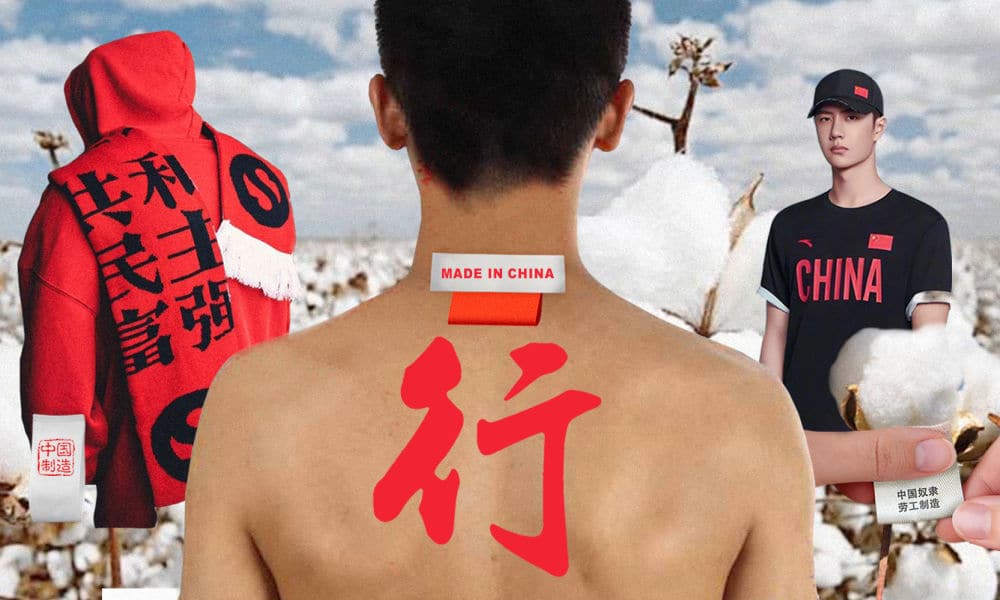
Image “Chinese fashion first: consumer nationalism and ‘China Chic’, by Ami/Goethe, see article here.
Condemnation and boycotting of Western brands also became prevalent during the Hong Kong protests in 2019, when Chinese social media users and state media condemned foreign brands for showing any signs of disregarding the One-China Policy. Asics, Calvin Klein, Coach, Givenchy, Versace, Swarovksi, and others were blamed for not respecting China’s sovereignty by listing Hong Kong and Taiwan as different countries on their websites or other products (read here).
In 2018, Italian fashion house D&G got caught up in a major controversy when its promo video campaign came under fire. In of their videos, a Chinese female model clumsily attempted to eat a large cannoli bread with chopsticks; a voice-over said that the cannoli might be “too big” for her. It was not received very well by many netizens on Chinese social media, where people called it “outdated and stereotypical,” “racist,” and “disrespectful.” The controversy snowballed out of control from there and became much worse after screenshots of racist comments attributed to fashion designer Stefano Gabba went viral (read here).
The recent BMW incident is thus part of a larger pattern of Western brands being accused of insulting and disrespecting Chinese people, while the popularity of Chinese (car) brands is rising. Earlier this month, What’s on Weibo wrote an article about how BMW often makes headlines in China in the context of horrific hit-and-run incidents and how the negative headlines are impacting BMW’s brand image in China.
BMW’s negative brand reputation in China exacerbates the impact of the ice cream incident, rather than alleviating it.
Although the brand has had a positive image for its high-quality and luxurious cars, it has also received a lot of unfavorable publicity, creating more negative associations – BMW drivers are generally seen as materialstic and flaunting their wealth. The nationwide attention for the ice cream incident and BMW MINI’s response to it has further damaged the brand’s reputation. The BMW stocks saw a price dip following the incident.
For some BMW car owners, the incident has also had negative consequences. According to various social media posts and photos, some BMW MINI owners saw their cars being scratched or vandalized over the past few days. At least one BMW MINI owner saw ice cream smeared over the front of their car.
3. The Snowball Effect of Social Media Storms
The incident involving BMW sparked a massive online controversy on Chinese social media, which quickly gained momentum. Initially triggered by one single video, it rapidly spiraled out of control as thousands of netizens joined in, expressing their views and creating their own videos and memes (also see this Twitter thread).
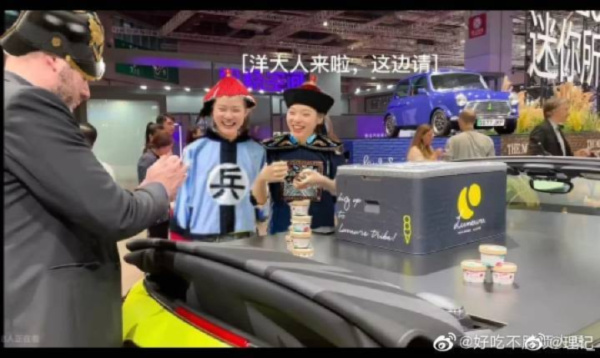
Some social media users also used old cartoons ridiculing preferential treatment for foreigners.
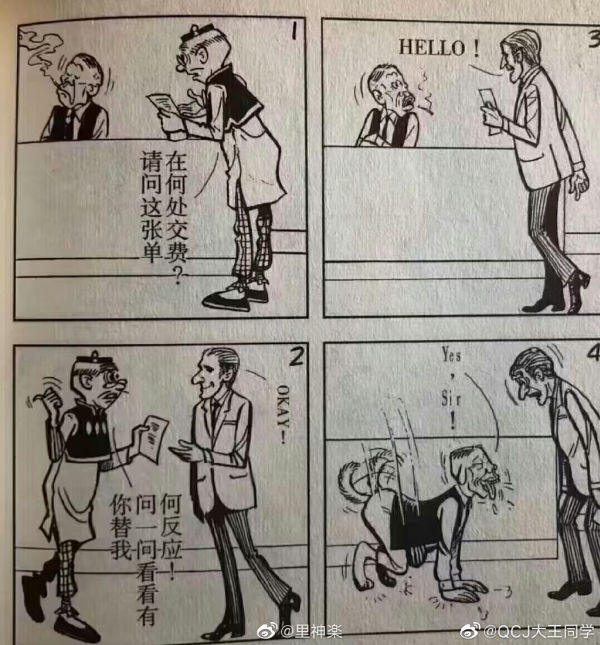
“Classic cartoon never goes out of date” (via Weibo/QCJ大王同学).
One meme suggested that “BMW” stands for: Bīngqílín (冰淇淋, Ice cream), Miǎnfèi (免费, Free), and Wàiguórén (外国人, Foreigners).
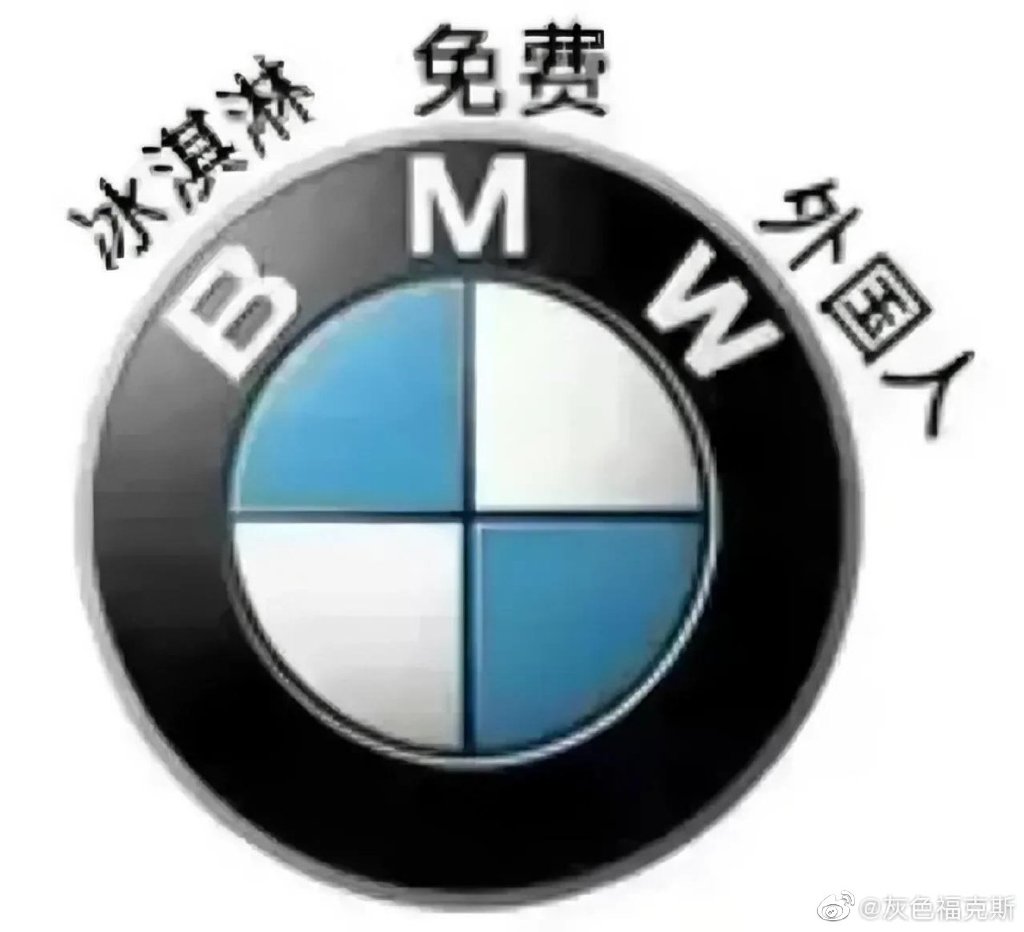
Besides general social media users, major brands also played a role in hyping up the incident. Other brands and companies used the firestorm to their advantage. Audi, for example, announced via social media that they would also be handing out ice cream only for Chinese people and other brands also started their own ice cream campaigns.

Chinese media outlets also played a major role in the incident as they kept reporting about the incident and promoted it on social media. By now, there are dozens of Weibo hashtags surrounding the incident and its aftermath, and the majority of them are initiated by Chinese media channels.
Chinese state media accounts also jabbed at BMW. CCTV aired an item showing that there is plenty of ice cream for all staff members on board of the Shandong PLA Navy aircraft carrier. Xinhua News even turned it into a hashtag, accompanied by a laughing emoji (#山东舰今天的冰淇淋是草莓味的#).
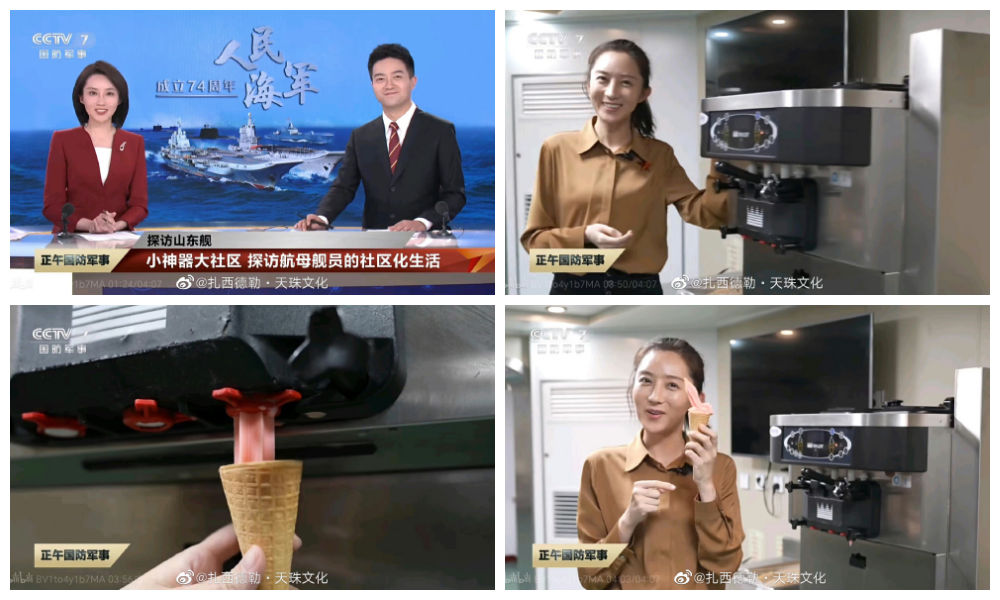
Screenshots from CCTV.
“We won’t give it to other countries,” some commenters joked: “Only Chinese can eat it.”
Meanwhile, some big KOL and influencer acounts also helped to attract more attention to the case by discussing it. Chinese political commentator Hu Xijin (@胡锡进), for example, also analyzed the incident. Although Hu called on netizens to be reasonable and have some understanding for the ordinary people who suddenly find themselves at the center of a social media storm, the mere fact that Hu brought the incident up multiple times to his 25 million Weibo followers perhaps did not exactly help in quieting things down.
For now, it seems that the BMW incident might keep fermenting for some time to come. While everyone is still talking about the ice cream incident, a second marketing faux-pas has already come up again as the next promotional freebie given away to visitors at the Shanghai Auto Show BMW booth is a wooden dog-shaped key hanger, giving people the option to engrave their name on it.
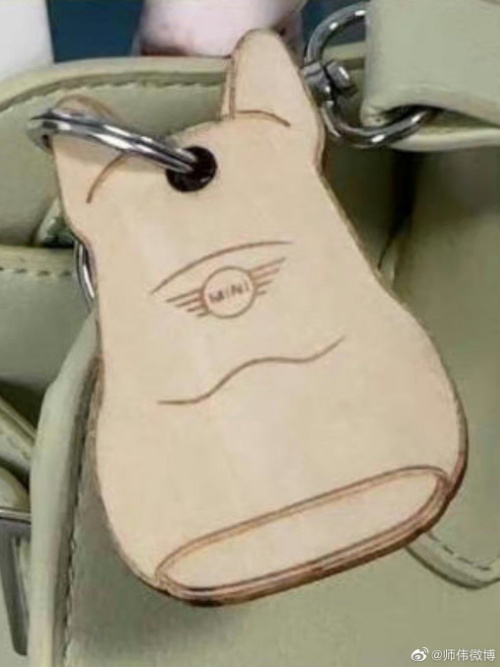
Many people also had an issue with this promo campaign: “So first they won’t give us ice cream, now they’re handing out dog tags with our name on it?”
Despite the controversy, many people still lined up at the BMW booth to get their freebies. The online discussions on the issue only seemed to bring more people to the car show. Turns out that bad publicity, after all, is still publicity.
Read more BMW-related articles here.
By Manya Koetse, with contributions by Miranda Barnes
Follow @whatsonweibo
Get the story behind the hashtag. Subscribe to What’s on Weibo here to receive our newsletter and get access to our latest articles:
References
Bickers, Robert A., and Jeffrey N. Wasserstrom. 1995. “Shanghai’s ‘Dogs and Chinese Not Admitted’ Sign: Legend, History and Contemporary Symbol.” The China Quarterly 142: pp. 444–66. JSTOR, http://www.jstor.org/stable/655423. Accessed 24 Apr. 2023.
Image
Part of featured image by Mae Mu on Unsplash
Spotted a mistake or want to add something? Please let us know in comments below or email us. First-time commenters, please be patient – we will have to manually approve your comment before it appears.
©2023 Whatsonweibo. All rights reserved. Do not reproduce our content without permission – you can contact us at info@whatsonweibo.com.
Manya Koetse is the founder and editor-in-chief of whatsonweibo.com. She is a writer, public speaker, and researcher (Sinologist, MPhil) on social trends, digital developments, and new media in an ever-changing China, with a focus on Chinese society, pop culture, and gender issues. She shares her love for hotpot on hotpotambassador.com. Contact at manya@whatsonweibo.com, or follow on Twitter.

China Books & Literature
Why Chinese Publishers Are Boycotting the 618 Shopping Festival
Bookworms love to get a good deal on books, but when the deals are too good, it can actually harm the publishing industry.
Published
2 months agoon
June 8, 2024By
Ruixin Zhang
JD.com’s 618 shopping festival is driving down book prices to such an extent that it has prompted a boycott by Chinese publishers, who are concerned about the financial sustainability of their industry.
When June begins, promotional campaigns for China’s 618 Online Shopping Festival suddenly appear everywhere—it’s hard to ignore.
The 618 Festival is a product of China’s booming e-commerce culture. Taking place annually on June 18th, it is China’s largest mid-year shopping carnival. While Alibaba’s “Singles’ Day” shopping festival has been taking place on November 11th since 2009, the 618 Festival was launched by another Chinese e-commerce giant, JD.com (京东), to celebrate the company’s anniversary, boost its sales, and increase its brand value.
By now, other e-commerce platforms such as Taobao and Pinduoduo have joined the 618 Festival, and it has turned into another major nationwide shopping spree event.
For many book lovers in China, 618 has become the perfect opportunity to stock up on books. In previous years, e-commerce platforms like JD.com and Dangdang (当当) would roll out tempting offers during the festival, such as “300 RMB ($41) off for every 500 RMB ($69) spent” or “50 RMB ($7) off for every 100 RMB ($13.8) spent.”
Starting in May, about a month before 618, the largest bookworm community group on the Douban platform, nicknamed “Buying Like Landsliding, Reading Like Silk Spinning” (买书如山倒,看书如抽丝), would start buzzing with activity, discussing book sales, comparing shopping lists, or sharing views about different issues.

Social media users share lists of which books to buy during the 618 shopping festivities.
This year, however, the mood within the group was different. Many members posted that before the 618 season began, books from various publishers were suddenly taken down from e-commerce platforms, disappearing from their online shopping carts. This unusual occurrence sparked discussions among book lovers, with speculations arising about a potential conflict between Chinese publishers and e-commerce platforms.
A joint statement posted in May provided clarity. According to Chinese media outlet The Paper (@澎湃新闻), eight publishers in Beijing and the Shanghai Publishing and Distribution Association, which represent 46 publishing units in Shanghai, issued a statement indicating they refuse to participate in this year’s 618 promotional campaign as proposed by JD.com.
The collective industry boycott has a clear motivation: during JD’s 618 promotional campaign, which offers all books at steep discounts (e.g., 60-70% off) for eight days, publishers lose money on each book sold. Meanwhile, JD.com continues to profit by forcing publishers to sell books at significantly reduced prices (e.g., 80% off). For many publishers, it is simply not sustainable to sell books at 20% of the original price.
One person who has openly spoken out against JD.com’s practices is Shen Haobo (沈浩波), founder and CEO of Chinese book publisher Motie Group (磨铁集团). Shen shared a post on WeChat Moments on May 31st, stating that Motie has completely stopped shipping to JD.com as it opposes the company’s low-price promotions. Shen said it felt like JD.com is “repeatedly rubbing our faces into the ground.”
Nevertheless, many netizens expressed confusion over the situation. Under the hashtag topic “Multiple Publishers Are Boycotting the 618 Book Promotions” (#多家出版社抵制618图书大促#), people complained about the relatively high cost of physical books.
With a single legitimate copy often costing 50-60 RMB ($7-$8.3), and children’s books often costing much more, many Chinese readers can only afford to buy books during big sales. They question the justification for these rising prices, as books used to be much more affordable.
Book blogger TaoLangGe (@陶朗歌) argues that for ordinary readers in China, the removal of discounted books is not good news. As consumers, most people are not concerned with the “life and death of the publishing industry” and naturally prefer cheaper books.
However, industry insiders argue that a “price war” on books may not truly benefit buyers in the end, as it is actually driving up the prices as a forced response to the frequent discount promotions by e-commerce platforms.
China News (@中国新闻网) interviewed publisher San Shi (三石), who noted that people’s expectations of book prices can be easily influenced by promotional activities, leading to a subconscious belief that purchasing books at such low prices is normal. Publishers, therefore, feel compelled to reduce costs and adopt price competition to attract buyers. However, the space for cost reduction in paper and printing is limited.
Eventually, this pressure could affect the quality and layout of books, including their binding, design, and editing. In the long run, if a vicious cycle develops, it would be detrimental to the production and publication of high-quality books, ultimately disappointing book lovers who will struggle to find the books they want, in the format they prefer.
This debate temporarily resolved with JD.com’s compromise. According to The Paper, JD.com has started to abandon its previous strategy of offering extreme discounts across all book categories. Publishers now have a certain degree of autonomy, able to decide the types of books and discount rates for platform promotions.
While most previously delisted books have returned for sale, JD.com’s silence on their official social media channels leaves people worried about the future of China’s publishing industry in an era dominated by e-commerce platforms, especially at a time when online shops and livestreamers keep competing over who has the best book deals, hyping up promotional campaigns like ‘9.9 RMB ($1.4) per book with free shipping’ to ‘1 RMB ($0.15) books.’
This year’s developments surrounding the publishing industry and 618 has led to some discussions that have created more awareness among Chinese consumers about the true price of books. “I was planning to bulk buy books this year,” one commenter wrote: “But then I looked at my bookshelf and saw that some of last year’s books haven’t even been unwrapped yet.”
Another commenter wrote: “Although I’m just an ordinary reader, I still feel very sad about this situation. It’s reasonable to say that lower prices are good for readers, but what I see is an unfavorable outlook for publishers and the book market. If this continues, no one will want to work in this industry, and for readers who do not like e-books and only prefer physical books, this is definitely not a good thing at all!”
By Ruixin Zhang, edited with further input by Manya Koetse
Independently reporting China trends for over a decade. Like what we do? Support us and get the story behind the hashtag by subscribing:
Spotted a mistake or want to add something? Please let us know in comments below or email us. First-time commenters, please be patient – we will have to manually approve your comment before it appears.
©2024 Whatsonweibo. All rights reserved. Do not reproduce our content without permission – you can contact us at info@whatsonweibo.com.
China Brands, Marketing & Consumers
Chinese Sun Protection Fashion: Move over Facekini, Here’s the Peek-a-Boo Polo
From facekini to no-face hoodie: China’s anti-tan fashion continues to evolve.
Published
2 months agoon
June 6, 2024
It has been ten years since the Chinese “facekini”—a head garment worn by Chinese ‘aunties’ at the beach or swimming pool to prevent sunburn—went international.
Although the facekini’s debut in French fashion magazines did not lead to an international craze, it did turn the term “facekini” (脸基尼), coined in 2012, into an internationally recognized word.
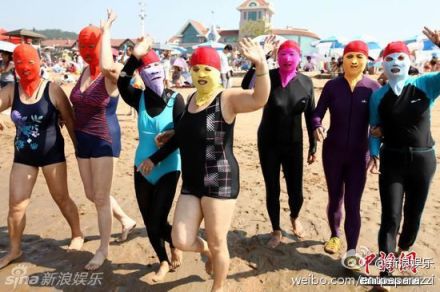
The facekini went viral in 2014.
In recent years, China has seen a rise in anti-tan, sun-protection garments. More than just preventing sunburn, these garments aim to prevent any tanning at all, helping Chinese women—and some men—maintain as pale a complexion as possible, as fair skin is deemed aesthetically ideal.
As temperatures are soaring across China, online fashion stores on Taobao and other platforms are offering all kinds of fashion solutions to prevent the skin, mainly the face, from being exposed to the sun.

One of these solutions is the reversed no-face sun protection hoodie, or the ‘peek-a-boo polo,’ a dress shirt with a reverse hoodie featuring eye holes and a zipper for the mouth area.

This sun-protective garment is available in various sizes and models, with some inspired by or made by the Japanese NOTHOMME brand. These garments can be worn in two ways—hoodie front or hoodie back. Prices range from 100 to 280 yuan ($13-$38) per shirt/jacket.

The no-face hoodie sun protection shirt is sold in various colors and variations on Chinese e-commerce sites.
Some shops on Taobao joke about the extreme sun-protective fashion, writing: “During the day, you don’t know which one is your wife. At night they’ll return to normal and you’ll see it’s your wife.”

On Xiaohongshu, fashion commenters note how Chinese sun protective clothing has become more extreme over the past few years, with “sunburn protection warriors” (防晒战士) thinking of all kinds of solutions to avoid a tan.

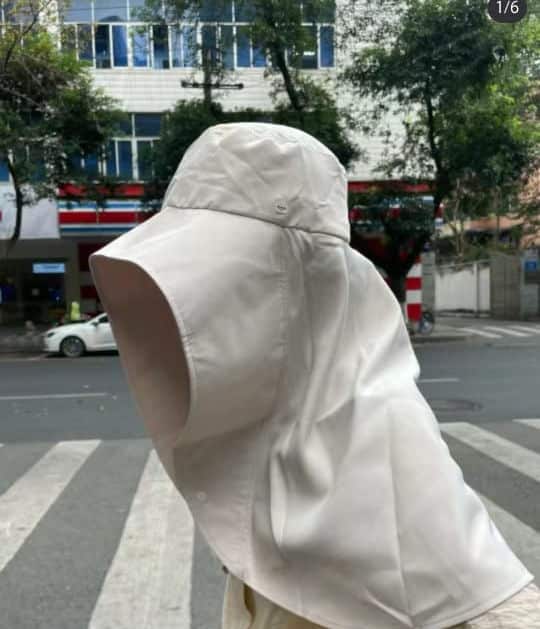


Although there are many jokes surrounding China’s “sun protection warriors,” some people believe they are taking it too far, even comparing them to Muslim women dressed in burqas.
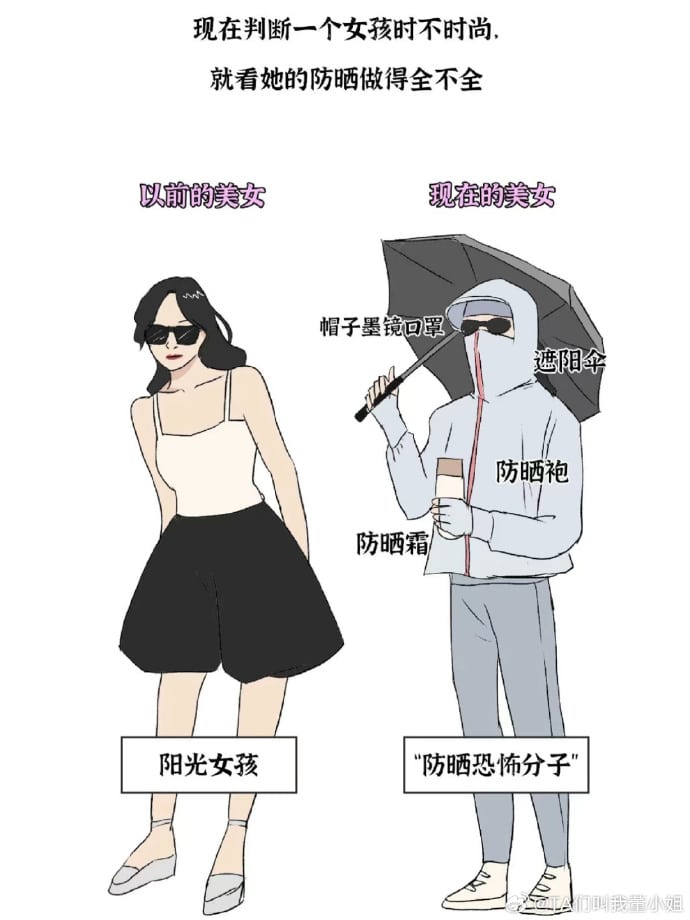
Image shared on Weibo by @TA们叫我董小姐, comparing pretty girls before (left) and nowadays (right), also labeled “sunscreen terrorists.”
Some Xiaohongshu influencers argue that instead of wrapping themselves up like mummies, people should pay more attention to the UV index, suggesting that applying sunscreen and using a parasol or hat usually offers enough protection.
By Manya Koetse, with contributions by Miranda Barnes
Spotted a mistake or want to add something? Please let us know in comments below or email us. First-time commenters, please be patient – we will have to manually approve your comment before it appears.
©2024 Whatsonweibo. All rights reserved. Do not reproduce our content without permission – you can contact us at info@whatsonweibo.com.
Subscribe

Weibo Watch: The Future is Here

“Bye Bye Biden”: Biden’s Many Nicknames in Chinese

Enjoying the ‘Sea’ in Beijing’s Ditan Park

A Triumph for “Comrade Trump”: Chinese Social Media Reactions to Trump Rally Shooting

Weibo Watch: Get Up, Stand Up

The Tragic Story of “Fat Cat”: How a Chinese Gamer’s Suicide Went Viral

“Old Bull Eating Young Grass”: 86-Year-Old Chinese Painter Fan Zeng Marries 36-Year-Old Xu Meng

A Brew of Controversy: Lu Xun and LELECHA’s ‘Smoky’ Oolong Tea

Singing Competition or Patriotic Fight? Hunan TV’s ‘Singer 2024’ Stirs Nationalistic Sentiments

Zara Dress Goes Viral in China for Resemblance to Haidilao Apron

Weibo Watch: The Battle for the Bottom Bed

About the “AI Chatbot Based on Xi Jinping” Story

China’s Intensified Social Media Propaganda: “Taiwan Must Return to Motherland”

Weibo Watch: Telling China’s Stories Wrong

Saying Goodbye to “Uncle Wang”: Wang Wenbin Becomes Chinese Ambassador to Cambodia
Get in touch
Would you like to become a contributor, or do you have any tips or suggestions? Get in touch here!
Popular Reads
-

 China Insight3 months ago
China Insight3 months agoThe Tragic Story of “Fat Cat”: How a Chinese Gamer’s Suicide Went Viral
-

 China Music4 months ago
China Music4 months agoThe Chinese Viral TikTok Song Explained (No, It’s Not About Samsung)
-

 China Digital10 months ago
China Digital10 months agoToo Sexy for Weibo? Online Discussions on the Concept of ‘Cābiān’
-

 China Arts & Entertainment12 months ago
China Arts & Entertainment12 months agoBehind 8 Billion Streams: Who is Dao Lang Cursing in the Chinese Hit Song ‘Luocha Kingdom’?





BRIAN LOPEZ
April 29, 2023 at 5:28 am
Man, the nationalism goes deep, no? It’s their own government, not foreign powers. It’s quite sad how easy to manipulate.